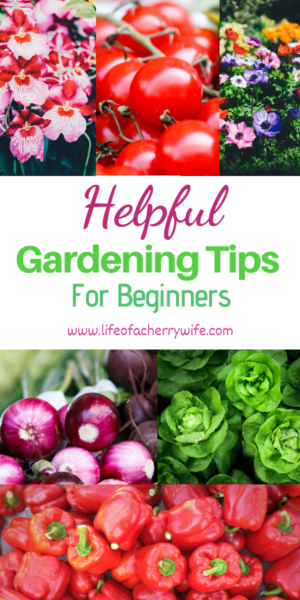
Are you looking for gardening tips? Never gardened before and wanting to dip your hands into some soil? Whether you are planting some beautiful flowers or a garden harvest, gardening is one of the most rewarding things you can do. If you are new to gardening, it can seem overwhelming and you may not know where to start.
How To Start A Garden- Gardening Tips
Gardening can be easier if you break it down into manageable steps. Having steps can make the process easier and you can also go at your own pace.
Steps To Starting A Garden
1. Decide on what to plant.
Different garden vegetables and plants have different seasons for blooming. Some can be all year, and some can be seasonal like tulips. In addition, research what kind of soil is best for what you want to plant.
Some plants do not do well in certain types of soil, so make sure that you have or have access to the best soil for whatever it is that you want you plant. The different types of soil such as loam, clay or sandy can have an impact on your plants and the overall success of your garden.
What Do I Need To Start A Garden?
2. Location, Location, Location.
Gardening is all about the real estate. Some plants need partial sun, some need full, etc. Many vegetables and some flowers 6-10 hours of full sun, and others do not. Also, make sure that you plant your garden somewhere that you will see everyday. It is true what they say, “out of sight, out of mind”.
In addition:
- Chose a flat surface location. Dealing with sloping when having a garden will cause issues in the future.
- Check for high winds in the garden location. High winds can cause damage to a garden.
3. Get the Ground Ready
Clear the area of any weeds or any other material that can harm your plants. Make sure the soil is ready for planting. The more fertile the soil, the better your garden will grow. If you live in a residential, new construction neighborhood, many times this soil has been stripped of the top soil.
You can fix this by spreading 2 to 3 inches of compost from organic matter. This could be decayed leaves, dry grass clippings or even old manure. Here is a link for more information about testing your soil.
When Should I Start My Garden?
4. Water at the Right Time
In the beginning, seedlings should always be watered and not allowed to dry out. As plants get larger, you can phase out a little bit. If you transplant, you may also need to water additionally. Overall, how often you water depends on soil, humidity and rainfall. Water slowly so the water absorbs instead of running off.
A Good Rule of Thumb…
Feel the soil 3 to 4 inches below the surface. If it feels dry, it’s time to water.
Gardening Tips- The Basics
5. Mulch Can Protect Your Garden
Mulch can keep the moisture in and the weeds out. It is best to cover the soil with a layer of mulch. Mulch can also help keep the weeds out as well. There are different kinds of mulch such as shredded bark, straw, river rocks, bark or compost.
6. Keep Up With Garden Chores
Water your plants. Pull the weeds before they get too big. Get rid of any dying, diseased or dead plants or vegetation. Harvest vegetables as soon as they are ready.
Learn about harmful insects and ways to banish them from your garden. If you are growing tall plants (like tomatoes), make sure you have the supplies needed to support future growth, like a trellis, steaks or a teepee.
Make sure to follow Life of a Cherry Wife on Facebook, Instagram and Pinterest!
7. Consider Containers
You can grow many plants in containers, including many vegetables, flowers, herbs, berries, shrubs and fruit trees.

Check Out My Other Related Family Posts:
Disclosure: This post may contain affiliate links. Please read my disclosure.

